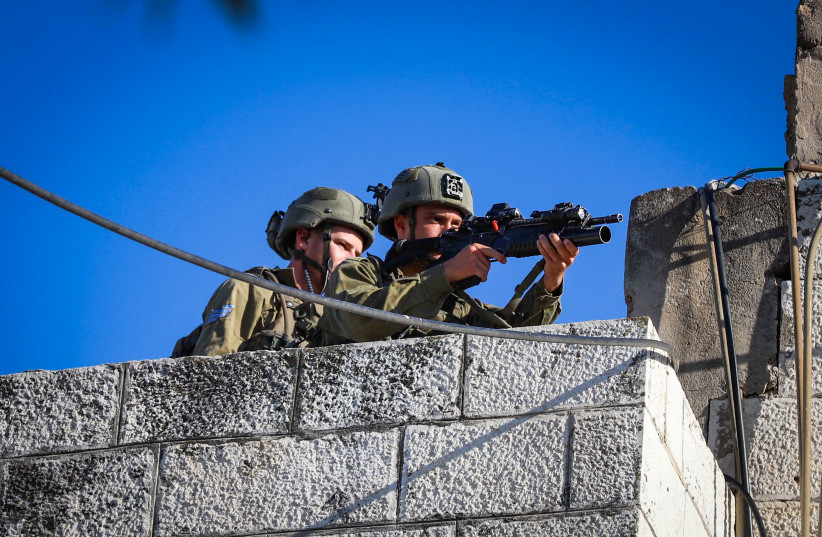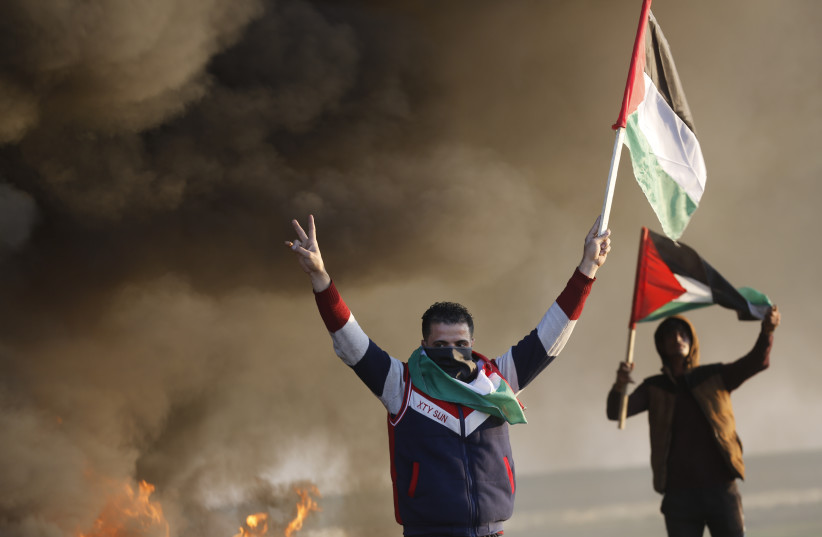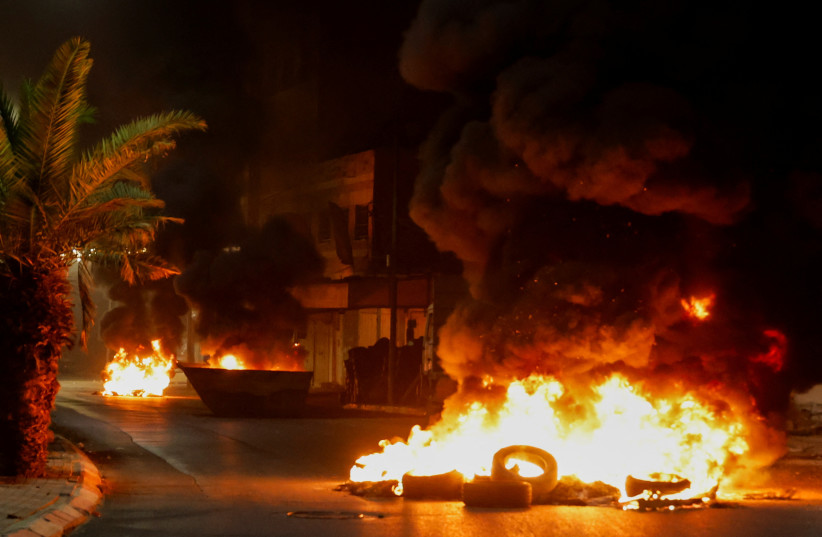The IDF might as well have posted a sign at the entryway to Jenin stating “We’ll be back”.
That’s how clear it is that its two-day military campaign in the northern West Bank Palestinian city this week was just one more battle in a prolonged IDF war on terror and not a decisive defeat.
“There is no silver bullet here,” former IDF intelligence chief Amos Yadlin told Army Radio, adding that those who think there is such a silver bullet, “don’t understand where we live and the strategic context of the battle on terror.”
Both Prime Minister Benjamin Netanyahu and Defense Minister Yoav Gallant issued statements in its aftermath that sounded more like men in the midst of war, rather than ones who had concluded it.
“I’m saying here and now - if Jenin returns to terrorism - we will return to Jenin, and it will happen much faster and with much greater force than one would imagine,” Netanyahu said.

Such words ran counter to the long-held hope by the Israeli Right and settler leaders that the IDF would embark on one intense military campaign to vanquish Palestinian terror in the West Bank akin to its Operation Defensive Shield in 2002, which focused heavily on Jenin.
Only this time, they hoped it would be larger and of course successful.
It is hard to match the drama of that April 2002 operation when IDF entered West Bank Palestinian cities, including Ramallah surrounding former PLO Chairman Yasser Arafat’s headquarters at the Mukataa.
In Jenin, where the worst of the fighting took place in 2002 soldiers went house to house, entering bobby-trapped structures. Twenty-three soldiers were killed in Jenin. By the time the month-long Operation Defensive Shield was finished in the West Bank, the number of IDF fatalities had risen to 30 and close to 500 West Bank Palestinians had been killed.
Terror decreased after the operation, which took place in the midst of the second intifada, but it certainly was not eliminated, with Palestinian executing large-scale suicide bombings in the months after the operation was over.
Nor has terror been vanquished this time around.
The IDF completed its two-day Jenin campaign this week, called Operation Home and Garden, in the midst of a larger and much wider scale campaign called Operation Break the Wave initiated at the end of March 2022 by which it has proactively entered Palestinian cities to route out terror cells.
IDF objectives for Operation Home and Garden were more in line with shoring up that larger operation than with eradicating Palestinian terror in Jenin.
“Terrorist activities will not disappear and the actions that the armed forces will take against it will go on,” former deputy head of the National Security Council Col. (res.) Itamar Yaar told reporters on Wednesday.
“We might see a limited operation [in Jenin as early as] tomorrow evening, [just] as these kinds of operations took place before this,” he explained during a virtual event hosted by MediaCentral hours after the IDF completed its campaign
“The battle against terror in Jenin is a day-to-day long-term operation," Yaar stated.

It was always an unlikely scenario that Israel could eliminate terror through a single military campaign. But the 21 years which followed Operation Defensive Shield have wrought significant changes in the Israeli-Palestinian conflict, that have made eliminating Palestinian terror almost impossible under the existing geo-political structure.
Military analysts, in fact, have been blunt that when it comes to the Israeli-Palestinian conflict the only option in front of them is to manage rather than eliminate the violence.
Here are five reasons why the battle for Jenin is not over and will not be until the conflict itself is resolved.
Jenin campaign had limited goal
It’s a sign of how protracted the battle against Palestinian violence in the West Bank, is that the goal of the operation was to preserve the army’s ability to operate against terror and not eliminate it. Operation Home and Garden augmented the ongoing Operation Break the Wave but did not subsume it.
Within that lens, the campaign was a surgical strike, in which one IDF and 12 Palestinian fatalities, with the army explaining that all the Palestinians killed were militants.
Jenin was a city that the IDF could not enter and was a refuge hub for every kind of terrorist, Yadlin said as he explained that security cameras throughout the city allowed militants to monitor the army’s activity and to attack its armored vehicles with explosive devices.
The strike which included armed drone attacks as well as ground forces, destroyed terror infrastructure, including monitoring devices, weapons laboratories and tunnels.
“Now it will be fairly easy [for the IDF] to enter,” Yadlin said.
But the strike did little to diminish the physical fighting power of the PIJ, as most of the forces including its leadership were able to escape or evade the IDF forces.
Nor did it sway other Palestinian terrorists not to attack Israel. To underscore this point, on the second day of the Jenin campaign, a Palestinian terrorist from the South Hebron Hills region of the West Bank attacked a bus stop in Tel Aviv, wounded nine, in a combined ramming and stabbing attack.
The PIJ, not the PA, control Jenin
The Palestinian Authority did not control Jenin when the IDF entered the city in 2002. It was not in control prior to Operation Home and Garden and certainly not in its aftermath.
Located in the northernmost part of Samaria, close to where the West Bank borders the Afula and Beit She’an areas, the PA has never had a stronghold in the city with a population of some 400,000.
The Palestinian Islamic Jihad largely controlled the city in 2002 and fully controls it today, that is particularly true in the refugee camp which was the main target of the IDF operation this week.
The terror group was originally formed in Gaza in 1981, with backing from Iran, and was considered to be loosely affiliated with the Muslim Brotherhood. Today it has the support both from Tehran and also from the Iranian proxy group Hezbollah in northern Lebanon.
Jenin is also the city with the least interaction with Jewish Israelis, who are rarely in that region, given that the IDF destroyed four settlements close to Jenin after the Gaza pullout in the summer of 2005.
IDF soldiers might have symbolically taken a photograph of themselves by the Jenin gate, where the PIJ Jenin Battalion had previously posed Now that the IDF has pulled out of the city, that battalion is back in what remains a largely abandoned part of the West Bank.

In the aftermath of the Jenin strike, security forces are braced for additional terror attacks both within sovereign Israel and the West Bank.
The Palestinian conflict isn’t over
If one is not in a peace process, then one is in a war process.
The terror stronghold in Jenin is a symptom of the protracted Israeli-Palestinian conflict and the lack of any process that could resolve it.
The peace process has been frozen since 2014 and the existing government has no interest in reviving it. Most of its members do not even believe in a Palestinian state.
Netanyahu, who has been one of the few not to publicly disavow an eventual Palestinian state. Even he, reportedly said at Knesset Foreign Affairs and Defense Committee closed-door session that Palestinian statehood aspirations must be halted.
The Right has argued that Palestinian statehood would only bolster Palestinian terror. Events in the last decade, however, have shown that the lack of Palestinian statehood without any other effective alternative, maintains and deepens the conflict.
The absence of any effective diplomatic process helps weaken public Palestinian support for the PA, whose raison d’être is to act as a transitionary body toward the diplomatic achievement of statehood.
It also provides an incentive to support groups like the PIJ, Palestinians that statehood is best gained through violence rather than diplomacy. This allows a group like the PIJ to entrench itself in Jenin, which has long been one of its strongholds.
The conflict is regionalized
The last decade has been marked by an increasing restoration of the regionalization of the Israeli-Palestinian conflict, which had been reduced through the Oslo process during the 1990s to largely a bilateral process at its core.
Israel’s battle against Palestinian terror during the second intifada was localized and did not involve the threat of any other state or non-state actors on Israel’s borders.
Israel controlled its border with Egypt, including in Gaza, and had only recently left Lebanon where the IDF had been stationed in the southern part of that neighboring country up north.
In the interim, Israel left Gaza, only to have the fundamentalist terror group Hamas seized control of the territory. Any contentious aspect of the Israeli-Palestinian conflict now bears, including Israeli military campaigns in the West Bank, now risks spilling over into Gaza.
Hamas increasingly uses its ability to fire rockets as far as Tel Aviv and slightly behind, in an attempt to deter Israel from taking actions it frowns on.
Palestinian groups in Lebanon also have the ability had have done so this year, to fire rockets from Israel’s northern border.
Israel had feared that any Jenin campaign that lasted more than a few days, would spark a two-border war, with Hamas in the South and Hezbollah and Palestinian groups in the north.
To highlight that threat, Palestinians in Gaza fired five rockets into southern Israel early Wednesday morning, that were taken out by the country’s Iron Dome system, with shrapnel from the interceptor missile damaging a home in the southern city of Sderot including one piece that fell in a children’s wading pool.
Iran’s West Bank proxy war
The West Bank is hardly the arena where one imagines that a proxy war with Iran is being played.
But that is increasingly the reality.
Iran has strengthened it tentacles in the Middle East and has a policy of actively distracting Israel by heating up its conflicts with such terror groups.
This has included Gaza and now the West Bank, where it is supporting the PIJ, including in Jenin.
Already last month, Iran’s Supreme Leader Ali Khamenei called the West Bank a “major battleground,” hosting PIJ leader from Gaza, Ziyad al-Nakhalah as well as Hamas leader Ismail Haniyeh.
In summing up Operation Home and Garden on Wednesday, Gallant said that the hands on the trigger in Jenin might belong to Palestinians, but the “funding is Iranian funding. In general, we recognize a long period of Iranian attempts to promote terrorism from Judea and Samaria through financing, targeting, and attempts to transport weapons.”
Yaar said that Iran was enrolling terror organizations “all over the Middle East to be active against Israel from every space they can use. They are there; they are under the scene as we speak.”
Maj.-Gen. Eitan Dangot, the former Coordinator of Government Activities in the Territories (COGAT) told reporters through MediaCentral this week that Tehran is working to create a circle of proxy groups around Israel.
“The Iranians are working very slowly and deeply on identifying the weakness of Israel and how to create around Israel a circle of terrorism” to distract it from focusing on Tehran’s main activity.
This includes light proxies in the West Bank, said Dangot. “The main goal is to create bloodshed inside the West Bank and Israel.”
Israel might be claiming the battleground victory in Jenin, but when they left, Palestinians celebrated the IDF’s defeat. If they had any doubt, they only needed to listen to a speech given by Iran’s Quds Force commander Esmael Qaani on Wednesday in which he lauded their efforts.
“We witnessed the Zionist regime mobilizing all its forces in the Jenin camp, but the Palestinian youth stood up against them,” he said, according to the Tehran Times.
On a physical level, the battle in Jenin reasserted the IDF’s growing prowess to move in and out of a conflict zone quickly with minimal casualties while achieving a limited military objective.
But for Palestinian civilians in the conflict area of Jenin, it was a disaster that destroyed homes and shops.
On every other level, it was just one more chapter in an intractable conflict – which, absent a diplomatic solution, has now become part of the background drama of an inevitable Israeli-Iran showdown.
